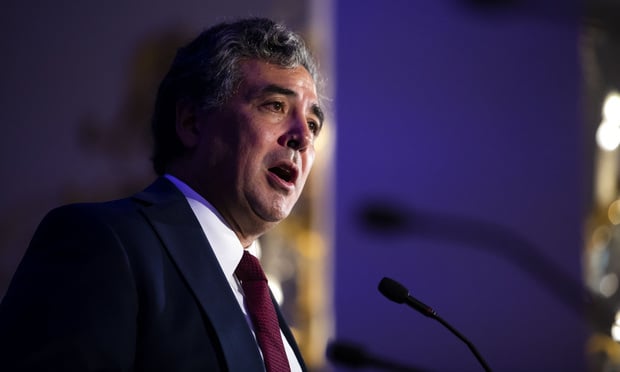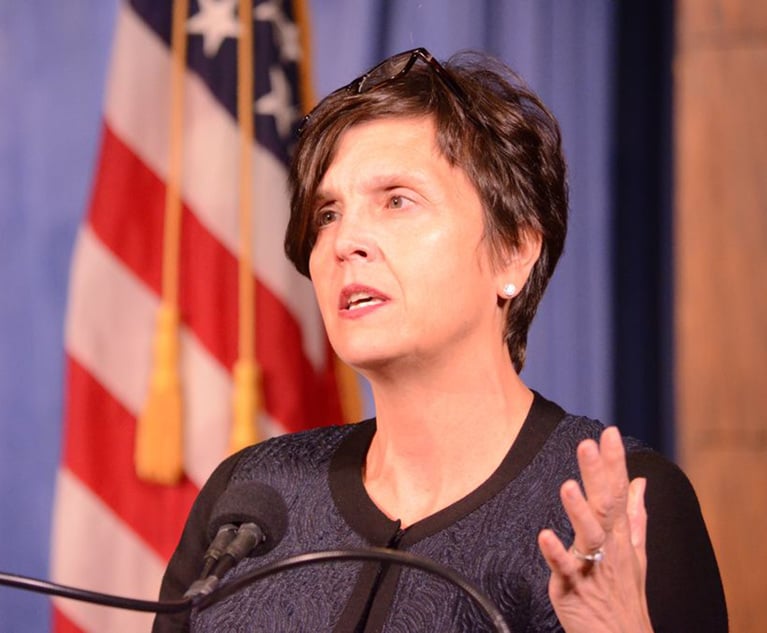Supreme Court Won't Block Trump's New Asylum Rule, for Now
Justices Sotomayor and Ginsburg dissented: "By granting a stay, the court simultaneously lags behind and jumps ahead of the courts below."
September 11, 2019 at 06:45 PM
6 minute read
The original version of this story was published on National Law Journal
 Supreme Court Justice Sonia Sotomayor. Photo: Diego M. Radzinschi/ National Law Journal.
Supreme Court Justice Sonia Sotomayor. Photo: Diego M. Radzinschi/ National Law Journal.
The U.S. Supreme Court on Wednesday boosted the Trump administration's efforts to limit immigration by allowing a rule to take effect that requires asylum seekers to first seek refuge in countries they pass through before coming to the United States.
In Barr v. East Bay Sanctuary Covenant, the high court, with Justices Ruth Bader Ginsburg and Sonia Sotomayor dissenting, temporarily lifted a nationwide injunction blocking enforcement of the so-called "third country" asylum rule. The injunction first was imposed July 24 by U.S. District Judge Jon Tigar o the Northern District of California. Tigar said the rule was likely invalid because it was "inconsistent with existing asylum laws."
The high court, without explanation, granted the government's request for a stay pending the outcome of the government's appeal to the U.S. Court of Appeals for the Ninth Circuit, or disposition by the Supreme Court of a petition for review, if a petition is filed following the Ninth Circuit decision.
Describing the government's stay request as "extraordinary," Sotomayor wrote:
"Once again the Executive Branch has issued a rule that seeks to upend longstanding practices regarding refugees who seek shelter from persecution. Although this Nation has long kept its doors open to refugees—and although the stakes for asylum seekers could not be higher—the Government implemented its rule without first providing the public notice and inviting the public input generally required by law."
Granting a stay pending an appeal should be an "extraordinary act," Sotomayor said, but the government appears to treat this approach as the "new normal." And while the government used to request it rarely, "now it does so reflexively," she wrote.
Under the asylum rule, Honduran and Salvaduran asylum seekers, for example, would have to apply first for protection from Guatemala or Mexico and be denied asylum before being eligible to apply in the United States.
In his request to block the injunction pending an appeal, U.S. Solicitor General Noel Francisco wrote, "The injunction prohibits the Executive Branch from implementing an interim final rule adopted to address an ongoing crisis at the southern border, with significant implications for ongoing diplomatic negotiations and foreign relations."
 U.S. Solicitor General Noel Francisco. Photo: Diego M. Radzinschi / NLJ
U.S. Solicitor General Noel Francisco. Photo: Diego M. Radzinschi / NLJHe also argued that U.S. asylum law expressly authorizes the relevant federal agencies to adopt new categorical bars to asylum, and the "third country" rule bar is consistent with the asylum statute's other provisions.
"At a minimum, the injunction is vastly overbroad," argued Francisco, and "violates the well-settled rule that injunctive relief must be limited to redressing a plaintiff's own injuries, and unduly interferes with the Executive's authority to establish immigration policy."
The organizations opposing the asylum rule, represented by Lee Gelernt of the American Civil Liberties Union Foundation, accused the administration of "a blatant end-run" around the congressionally enacted asylum law.
"Congress specifically addressed when an applicant can be denied asylum based on possible protection in a third country: when the applicant has been 'firmly resettled' in a third country or when the United States has signed a formal safe-third-country agreement with another country that provides access to a full and fair process for the individuals we turn away," wrote Gelernt. "These are the only two exceptions permitted by the statute and neither is met here."
The U.S. Court of Appeals for the Ninth Circuit on Aug. 16 granted the administration a partial stay of Tigar's injunction. The appellate panel, ruling 2-1, barred the rule's effect only in the nine states within the Ninth Circuit which include the border states of Arizona and California.
The panel ruled that Tigar failed to provide enough support for a nationwide or universal injunction, but that the challengers to the asylum rule were likely to prevail on the merits of their claims. But Tigar on Sept. 9 reinstated the injunction's nationwide scope pending a trial on the rule's legality. He said that the appellate court's action permitted him to consider an augmented record on the need for such an injunction.
Tigar then found that the organizations challenging the rule would suffer harms from the diversion of resources caused by having the rule operate outside of, but not inside of the Ninth Circuit. He also said a nationwide injunction was necessary to maintain uniform immigration policy and anything but a nationwide injunction would create "major administrability issues." Nationwide relief, he added, is also supported by the federal Administrative Procedure Act.
One day after Tigar acted, the Ninth Circuit issued an administrative stay of the district court's Sept. 9 injunction which, in effect, restored the state of affairs that existed when the Justice Department filed its application in the Supreme Court to block Tigar's July 24 injunction.
The Justice Department was supported in the high court by amicus briefs from the Immigration Reform Law Institute and 11 states led by Arizona. East Bay Sanctuary received amicus support from 28 nonprofit organizations and law school clinics that represent asylum seekers across the country.
The U.S. Supreme Court's order is posted below:
Read more:
Judge Tigar Doubles Down on National Injunction for Trump's Latest Asylum Rule
9th Circuit Panel Fractures Over National Injunctions With Trump's Latest Asylum Order
A Fair Day in Court Starts With an Independent Immigration Court System
This content has been archived. It is available through our partners, LexisNexis® and Bloomberg Law.
To view this content, please continue to their sites.
Not a Lexis Subscriber?
Subscribe Now
Not a Bloomberg Law Subscriber?
Subscribe Now
NOT FOR REPRINT
© 2025 ALM Global, LLC, All Rights Reserved. Request academic re-use from www.copyright.com. All other uses, submit a request to [email protected]. For more information visit Asset & Logo Licensing.
You Might Like
View All
Skadden and Steptoe, Defending Amex GBT, Blasts Biden DOJ's Antitrust Lawsuit Over Merger Proposal
4 minute read
'Lack of Independence' or 'Tethered to the Law'? Witnesses Speak on Bondi
4 minute read

Willkie Farr & Gallagher Drives Legal Challenge for Uber Against State's Rideshare Laws
5 minute readTrending Stories
- 1'A Death Sentence for TikTok'?: Litigators and Experts Weigh Impact of Potential Ban on Creators and Data Privacy
- 2Bribery Case Against Former Lt. Gov. Brian Benjamin Is Dropped
- 3‘Extremely Disturbing’: AI Firms Face Class Action by ‘Taskers’ Exposed to Traumatic Content
- 4State Appeals Court Revives BraunHagey Lawsuit Alleging $4.2M Unlawful Wire to China
- 5Invoking Trump, AG Bonta Reminds Lawyers of Duties to Noncitizens in Plea Dealing
Who Got The Work
J. Brugh Lower of Gibbons has entered an appearance for industrial equipment supplier Devco Corporation in a pending trademark infringement lawsuit. The suit, accusing the defendant of selling knock-off Graco products, was filed Dec. 18 in New Jersey District Court by Rivkin Radler on behalf of Graco Inc. and Graco Minnesota. The case, assigned to U.S. District Judge Zahid N. Quraishi, is 3:24-cv-11294, Graco Inc. et al v. Devco Corporation.
Who Got The Work
Rebecca Maller-Stein and Kent A. Yalowitz of Arnold & Porter Kaye Scholer have entered their appearances for Hanaco Venture Capital and its executives, Lior Prosor and David Frankel, in a pending securities lawsuit. The action, filed on Dec. 24 in New York Southern District Court by Zell, Aron & Co. on behalf of Goldeneye Advisors, accuses the defendants of negligently and fraudulently managing the plaintiff's $1 million investment. The case, assigned to U.S. District Judge Vernon S. Broderick, is 1:24-cv-09918, Goldeneye Advisors, LLC v. Hanaco Venture Capital, Ltd. et al.
Who Got The Work
Attorneys from A&O Shearman has stepped in as defense counsel for Toronto-Dominion Bank and other defendants in a pending securities class action. The suit, filed Dec. 11 in New York Southern District Court by Bleichmar Fonti & Auld, accuses the defendants of concealing the bank's 'pervasive' deficiencies in regards to its compliance with the Bank Secrecy Act and the quality of its anti-money laundering controls. The case, assigned to U.S. District Judge Arun Subramanian, is 1:24-cv-09445, Gonzalez v. The Toronto-Dominion Bank et al.
Who Got The Work
Crown Castle International, a Pennsylvania company providing shared communications infrastructure, has turned to Luke D. Wolf of Gordon Rees Scully Mansukhani to fend off a pending breach-of-contract lawsuit. The court action, filed Nov. 25 in Michigan Eastern District Court by Hooper Hathaway PC on behalf of The Town Residences LLC, accuses Crown Castle of failing to transfer approximately $30,000 in utility payments from T-Mobile in breach of a roof-top lease and assignment agreement. The case, assigned to U.S. District Judge Susan K. Declercq, is 2:24-cv-13131, The Town Residences LLC v. T-Mobile US, Inc. et al.
Who Got The Work
Wilfred P. Coronato and Daniel M. Schwartz of McCarter & English have stepped in as defense counsel to Electrolux Home Products Inc. in a pending product liability lawsuit. The court action, filed Nov. 26 in New York Eastern District Court by Poulos Lopiccolo PC and Nagel Rice LLP on behalf of David Stern, alleges that the defendant's refrigerators’ drawers and shelving repeatedly break and fall apart within months after purchase. The case, assigned to U.S. District Judge Joan M. Azrack, is 2:24-cv-08204, Stern v. Electrolux Home Products, Inc.
Featured Firms
Law Offices of Gary Martin Hays & Associates, P.C.
(470) 294-1674
Law Offices of Mark E. Salomone
(857) 444-6468
Smith & Hassler
(713) 739-1250








